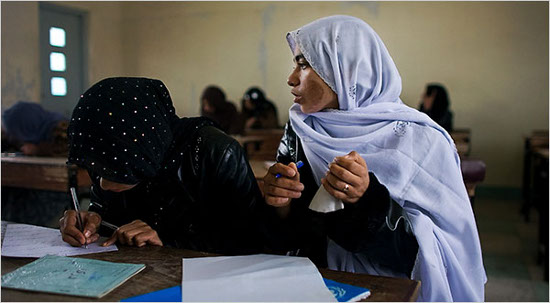|
|
|
Shamsia Husseini, right, was among 15 girls and women in Kandahar, Afghanistan, who were splashed with acid last November. Photo from The New York Times. |
The recent arguments over Afghanistan have focused on “going all in” with properly resourced counterinsurgency vs. keeping al Qaeda diminished via Predator strikes and super-secret squirrel (commando) raids. Seemingly lost in the vigorous debate between policy wonks, political pundits, and COIN aficionados is the impact of lesser US and NATO engagement on the state of human rights in our new ally. Wazhma Frogh, a human rights campaigner and recipient of the US State Department’s 2009 International Women of Courage Award for Afghanistan, pens an op-ed in The Washington Post that brings that picture into focus:
As an Afghan woman who for many years lived a life deprived of the most basic human rights, I find unbearable the thought of what will happen to the women of my country if it once again falls under the control of the insurgents and militants who now threaten it.
In 2001, when the war in Afghanistan began, the liberation of Afghan women was one of the most important justifications for military intervention. Has the world now changed its mind about Afghan women? Is it ready to let them once again be killed and tortured by militants? Does the world no longer believe in the principles it supported in 2001?
Handing over Afghanistan to those who intend to keep the country centuries behind most of the world — to men who do not view women as human beings — would not only call into doubt the global commitment to human rights, it would also raise questions about the commitment of Western democracies to such rights and to democratic values. Bearing in mind how fragile the Afghan government is at this moment, it will not take long for the country’s women to come under attack again. The consequences will be even more bitter this time because no matter how limited our success, we have at least managed to act in the forefront of public life in Afghanistan. We have had a taste of what it’s like to have rights.
As an unusually brave Afghan woman who is committed to bettering the lot of herself and others in her country, presumably Ms. Frogh speaks to those advocating US disengagement with a moral authority inherently lacking in the 30,000-foot dreams of idealistic neoconservatives.
Of course, human rights are not the only US priority in Afghanistan. And it’s disingenuous when nakedly political arguers (on the right or left) cynically employ them as a morally absolute trump card in service of a position. The inevitable critique of any justification involving human rights is that there is no shortage of Hellholes on the planet, where human beings live in virtual or actual slavery. If we are realistic and intellectually consistent, why should any particular example guide US policy? In this case, the answer is three-fold, consistent, and simple:
1. Human rights are not the only consideration, but deserve a serious place at any table headed by US security interests.
2. Afghanistan was considered the “good war of necessity” by most quarters of the American political landscape.
3. We’re already there.
And once American soldiers and Marines are the only thing standing between Afghan girls who want to go to school and rule by psychotic radicals slinging cups of acid, realpolitiks get several degrees colder. Whatever the forthcoming disposition of the Afghanistan strategy, it is every analyst’s duty to be up-front about that fact.
Are you a dedicated reader of FDD's Long War Journal? Has our research benefitted you or your team over the years? Support our independent reporting and analysis today by considering a one-time or monthly donation. Thanks for reading! You can make a tax-deductible donation here.









2 Comments
This should be considered a part of the long term strategy. Keeping half the population enslaved and illiterate seriously limits the economic potential in the region. Giving women basic education, access to credit, security and the change to set up cottage industries will promote economic growth. That in turn will create jobs for men, which provides an incentive to do something other than join a militia.
Challenging the customs will be harder in the Pashtun regions than the north or Kabul (and it will be tough there too); consider that it took a generation to get North Americans to wear seat belts, and that hardly affects one’s way of life. So tact will be required with this supporting effort.
Depends upon what “all in” means. 40,000 more U.S. troops, with none forward deployed is not all in. PK making deals with equally as bad Taliban, telegraphing its attacks, timidly attacking, and waiting for the first snow to fall as an excuse to exit is not all in.
By spring, we should have 40,000 more US troops on the ground, a couple extra carriers off the coast, a couple squadrons of Buffs in Deigo Garcia, and both the US and PK should launch a coordinated, all out offensive to rid both nations of the Taliban, al Qaeda, and PK’s domestic terror groups. We should first drive the enemy into PK, next be the anvil to PK’s hammer, provide USAF/USN support to PK’s offensive, and then play ping pong with the enemy until the last of them are dead. Won’t happen, I know, yet let’s stop fooling ourselves by calling anything less than going for total victory ‘all in.’